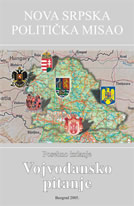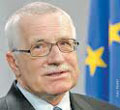| NSPM in English | |||
The Euro Zone Has Failed |
 |
 |
 |
| среда, 02. јун 2010. | |
|
(The Wall Street Journal, 01.6.2010)
As a long-standing critic of the idea of a European single currency, I have not rejoiced at the current problems in the euro zone because their consequences could be serious for all of us in Europe—for members and non-members of the euro zone, for its supporters and opponents. Even the enthusiastic propagandists of the euro suddenly speak about the potential collapse of the whole project now, and it is us critics who say we have to look at it in a more structured way. The term "collapse" has at least two meanings. The first is that the euro-zone project has not succeeded in delivering the positive effects that had been rightly or wrongly expected from it. It was mistakenly and irresponsibly presented as an indisputable economic benefit to all the countries willing to give up their own long-treasured currencies. Extensive studies published prior to the launch of the European single currency promised that the euro would help to accelerate economic growth and reduce inflation and stressed, in particular, that the member states of the euro zone would be protected against all kinds of external economic disruptions (the so-called exogenous shocks). This has not happened. After the establishment of the euro zone, the economic growth of its member states has slowed down compared to previous decades, increasing the gap between the rate of growth in the euro-zone countries and that in other major economies—such as the United States and China, smaller economies in Southeast Asia and other parts of the developing world, as well as Central and Eastern European countries that are not members of the euro zone. Economic growth in Europe has been slowing down since the 1960s, thanks to the increasingly damaging economic and social system which started dominating Europe at that time. The European "soziale Marktwirtschaft" is an unproductive variant of a welfare state, of state paternalism, of "leisure" society, of high taxes and low motivation to work. The existence of the euro has not reversed that trend. According to the European Central Bank, the average annual rate of growth in the euro-zone countries was 3.4% in the 1970s, 2.4% in the 1980s, 2.2% in the 1990s and only 1.1% from 2001 to 2009 (the decade of the euro). A similar slowdown has not occurred anywhere else in the world (speaking about "normal" countries, e.g. countries without wars or revolutions). Not even the expected convergence of inflation rates has taken place. Two distinct groups have formed within the euro zone—one (including most of the countries of western and northern Europe) with a low inflation rate and one (including Greece, Spain, Portugal and Ireland) with a higher inflation rate. We have also seen an increase in long-term trade imbalances. There are countries where exports exceed imports and countries that lastingly import more than they export. It is no coincidence that the latter countries also have higher inflation. It has no connection with the world-wide crisis. This crisis "only" escalated and exposed longtime hidden economic problems; it did not cause them. During its first 10 years, the euro zone has not led to any measurable homogenization of its member states' economies. The euro zone, which comprises 16 European countries, is not an "optimum currency area" as defined by the economic theory. Even Otmar Issing, the former member of the Executive Board and chief economist of the European Central Bank, has repeatedly pointed out (most recently in a speech in Prague in December 2009) that the establishment of the euro zone was primarily a political, not an economic, decision. In such a situation, it is inevitable that the costs of establishing and maintaining it exceed its benefits. My choice of the words "establishing" and "maintaining" is not accidental. Most economic commentators were satisfied by the ease and apparent inexpensiveness of the first step (the establishment of the common monetary area). This helped to form the impression that everything was fine with this project. The exchange rates of the countries joining the euro zone probably more or less reflected the economic reality at the time when the euro was born. However, over the last decade, the economic performance of euro-zone countries diverged and the negative effects of the "straight-jacket" of a single currency have become more and more visible. When "good weather" (in the economic sense of the word) prevailed, no visible problems arose. Once the crisis (or "bad weather") arrived, the lack of homogeneity manifested itself very clearly. In that sense, I dare say that—as a project that promised to be of considerable economic benefit to its members—the euro zone has failed. The second meaning of the term collapse is the possible collapse of the euro zone as an institution, the demise of the euro. To that question, my answer is no, it will not collapse. So much political capital had been invested in its existence and in its role as a "cement" that binds the EU on its way to supra-nationality that in the foreseeable future the euro will surely not be abandoned. It will continue, but at a very high price—low economic growth. It will bring economic losses even to non-members of the euro zone, like the Czech Republic. The huge amount of money that Greece will receive can be divided by the number of the euro-zone inhabitants, and each person can calculate his or her own "contribution." However, the "opportunity" costs arising from the loss of a potentially higher growth rate, which is much more difficult for a non-economist to imagine, will be far more painful. I do not doubt that for political reasons this price will be paid and that the euro-zone inhabitants will never find out just how much the euro truly cost them. The mechanism that will save the European monetary union is the increasing volume of financial transfers that will have to be sent to euro-zone countries suffering from the biggest economic and financial problems. Yet everyone knows that sending massive financial transfers is possible only in a state, and the EU, or the euro zone, is not a state. Only in a state there is a sufficient feeling of solidarity among its citizens. Only in a state—and unified Germany in the 1990s is an excellent example—can massive financial transfers be justified and made politically viable. (By the way, the inter-German financial transfers in that era annually equaled the whole sum potentially needed for Greece to survive). Twenty years ago, I happened to be the minister of finance in a dissolving political—and monetary—union called Czechoslovakia. I have to confess that the country broke up because of the lack of mutual solidarity. That is why Europe will have to decide whether to centralize itself politically as well. Europeans don't want that because they know (or at least feel) that it would be to the detriment of liberty and prosperity. There is, however, a real danger that the politicians will do it anyway—behind the backs of those who elected them. And this is what bothers me most. The recent dealings in EU headquarters in Brussels—literally behind closed doors—about the aid package for Greece demonstrated that there is no democracy there. The German-French tandem made the decision on behalf of the rest of the euro-zone countries, and I am afraid this will continue. It is evident that the euro—the European single currency—and the currently proposed measures to save the euro do not represent any "salvation" for the European economy. In the long run, it can be saved only by a radical restructuring of the European economic and social system. My country had a velvet revolution and made a radical transformation of its political, economic and social structures. Fifteen years ago, I sometimes joked that after entering the EU we should start a velvet revolution there as well. Unfortunately, this ceases to be a joke now. The Czech Republic has not made a mistake by avoiding the membership in the euro zone. I am glad we are not the only country taking that view. In April, the Financial Times published an article by the late governor of the Polish central bank, Slawomir Skrzypek. He wrote it shortly before his tragic death in an airplane crash near Smolensk, Russia. In that article, Mr. Skrzypek wrote, "As a non-member of the euro, Poland has been able to profit from flexibility of the zloty exchange rate in a way that has helped growth and lowered the current account deficit without importing inflation." He added that "the decade-long story of peripheral euro members drastically losing competitiveness has been a salutary lesson." There is no need to add anything to that. Václav Klaus has served as president of the Czech Republic since 2003. |
Од истог аутора
Остали чланци у рубрици
- Playing With Fire in Ukraine
- Kosovo as a res extra commercium and the alchemy of colonization
- The Balkans XX years after NATO aggression: the case of the Republic of Srpska – past, present and future
- Из архиве - Remarks Before the Foreign Affairs Committee of the European Parliament
- Dysfunction in the Balkans - Can the Post-Yugoslav Settlement Survive?
- Serbia’s latest would-be savior is a modernizer, a strongman - or both
- Why the Ukraine Crisis Is the West’s Fault
- The Ghosts of World War I Circle over Ukraine
- Nato's action plan in Ukraine is right out of Dr Strangelove
- Why Yanukovych Said No to Europe

.jpg)








 By After the fall of communism in 1989, the Czech Republic wanted to be a normal European country again as soon as possible, after being excluded from participating in the post-World War II European integration process for 41 years. The only way to achieve this was to become a member country of the European Union. We had no other choice, but the communist experience was still too "fresh." We wanted to be free and didn't want to lose our freedom and our finally regained sovereignty. Many of us were therefore in favor of a looser form of European integration, against the so-called deepening of the EU and against the creation of political union in Europe. People like me understood very early that the idea of a European single currency is a dangerous project which will either bring big problems or lead to the undemocratic centralization of Europe. My position was clear: With all my reservations, we had to apply for EU membership, but at the same time we had to fight against projects such as the euro.
By After the fall of communism in 1989, the Czech Republic wanted to be a normal European country again as soon as possible, after being excluded from participating in the post-World War II European integration process for 41 years. The only way to achieve this was to become a member country of the European Union. We had no other choice, but the communist experience was still too "fresh." We wanted to be free and didn't want to lose our freedom and our finally regained sovereignty. Many of us were therefore in favor of a looser form of European integration, against the so-called deepening of the EU and against the creation of political union in Europe. People like me understood very early that the idea of a European single currency is a dangerous project which will either bring big problems or lead to the undemocratic centralization of Europe. My position was clear: With all my reservations, we had to apply for EU membership, but at the same time we had to fight against projects such as the euro.










